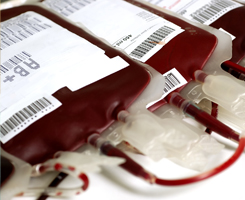Benefits of Blood Transfusions
| Tweet |
By Billie Rubin, Hemoglobin’s Catabolic Cousin, reporting from the labs of Stanford Blood Center
A unit of blood does so much for patients in need. The gift of life is donated, tested, processed and sent to hospitals’ transfusion service departments where more important work is done to ensure it is compatible with the recipient.
Once the unit is ready to go, it has a number of advantages to offer. These are some of the benefits your donated blood can provide for patients in need:
1. Increase low hemoglobin levels: low hemoglobin can cause damage to body organs and tissues due to low oxygen levels.
2. Help stop bleeding: bleeding may not be controlled if platelets and/or clotting factors are low.
3. Keep the heart pumping: low blood volume can lead to low pressure and the heart may not be able maintain the circulation of blood.
4. Help with serious blood infections when other methods fail. Granulocyte transfusions, for example.
5. Provide red cells and platelets when the bone marrow is compromised: as with blood cancers, bone marrow transplants, chemotherapy.
6. Provide red cells and platelets for patients with blood disorders: such as sickle cell, thallasemias, myelodysplasia, aplastic anemia.
7. Save someone’s life.

